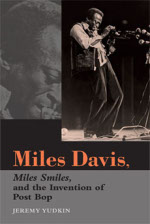Home » Jazz Articles » Book Review » Miles Davis, Miles Smiles, and the Invention of Post Bop
Miles Davis, Miles Smiles, and the Invention of Post Bop
 Miles Davis, Miles Smiles, and the Invention of Post Bop
Miles Davis, Miles Smiles, and the Invention of Post Bop Jeremy Yudkin
Indiana University Press
ISBN: 978-0-253-21952-7
184 pages
More books have been written about trumpeter Miles Davis than any other jazz musician, leaving authors who want to tackle him with little option other than to present their own unique take on his legacy.
Jeremy Yudkin, a professor of music at Boston University's College of Fine Arts, tackles the subject with an admirable new spin. His Miles Davis, Miles Smiles, and the Invention of Post Bop is all about Davis' benchmark album Miles Smiles (CBS, 1966) and how influential it was for the post bop movement.
Well, that's not quite all that the book addresses. Yudkin begins with a brief history of the Dark Prince's ascent to greatness, building up to the achievements of his second great quintet. Yudkin feels that it is important to show the advancements that Davis made up until his mid to late 1960s recordings to establish a context for what he was up to with Miles Smiles.
Although it seems like this would cover similar ground as previous books (and it does), what saves Yudkin's writing is the quality of his prose, which is informed and scholarly, yet accessible and colorful. His breezy travels through Davis' earlier career is not your typical university text, bearing more of a likeness to the late British author Richard Cook's approachable writing than stuffy intellectual verbiage.
Yudkin's approach is to capture Davis's career by presenting an overview of each period, then analyzing in depth a representative work form each of these. "Boplicity," for instance, is the benchmark recording for the cool period, and "Bag's Groove" represents the transitional period that followed. Of course Kind Of Blue (CBS, 1959) gets its due, and Yudkin captures the charms of that recording as well as any other writer.
Miles Smiles gets a couple of chapters of in-depth analysis, and while there's no question that this period was very influential to many of the artists who followed in his wake, Yudkin makes the case that this is the album that defines what Davis was up to at the time. While this isn't quite as brazen as saying that On The Corner (CBS, 1972) is his greatest work, nevertheless, Yudkin carefully works through the tracks, showcasing the ingenuity that went into each performance. Reading the book while listening to the album would provide an enhanced understanding of the various components that make up this fine performance (and all the others that Yudkin analyzes.)
Yudkin provides transcriptions of solos, some of which have never appeared in print before. While those who aren't familiar with jazz will find them superfluous, they don't distract from the accessible scholarship the author provides.
Although much of the book covers ground that those familiar with Davis will already know, Yudkin's book provides wonderful prose that explains and illuminates the well known recordings. It is one of the best Miles Davis books: a brief introduction to the great musician with novel explanations of the music for those already well versed in his recorded legacy.
< Previous
A Distant Youth
Next >
If I can make it here...
Comments
Tags
For the Love of Jazz
 All About Jazz has been a pillar of jazz since 1995, championing it as an art form and, more importantly, supporting the musicians who create it. Our enduring commitment has made "AAJ" one of the most culturally important websites of its kind, read by hundreds of thousands of fans, musicians and industry figures every month.
All About Jazz has been a pillar of jazz since 1995, championing it as an art form and, more importantly, supporting the musicians who create it. Our enduring commitment has made "AAJ" one of the most culturally important websites of its kind, read by hundreds of thousands of fans, musicians and industry figures every month.























